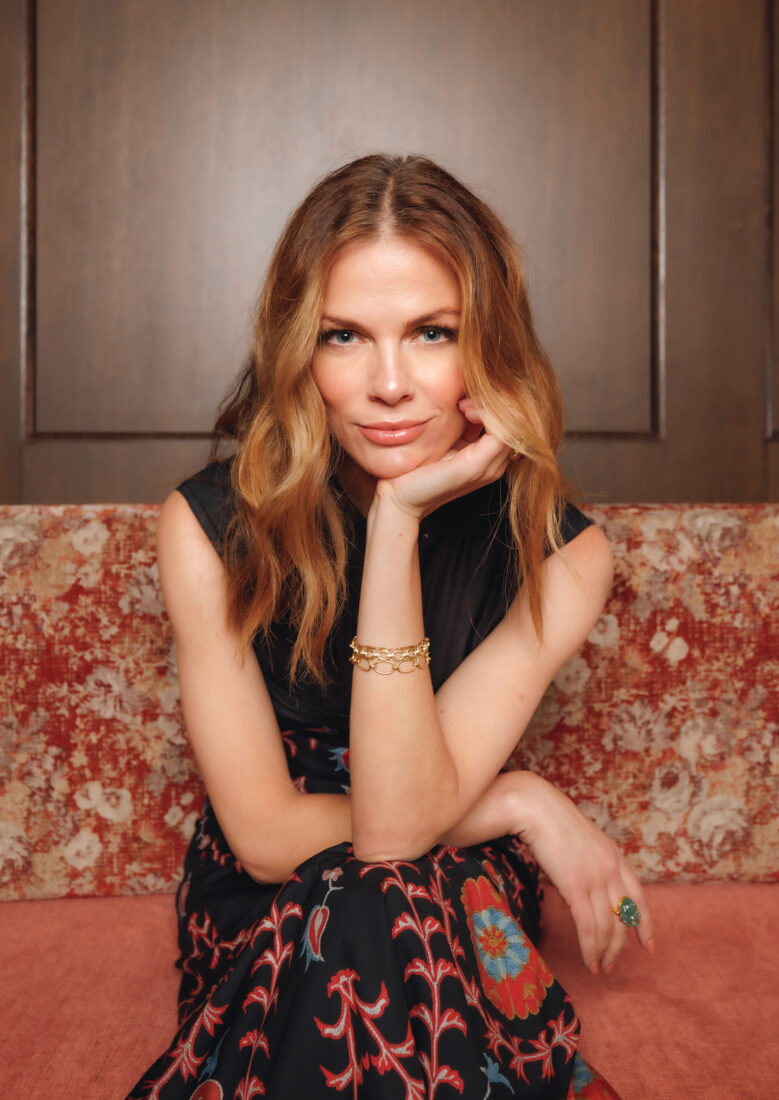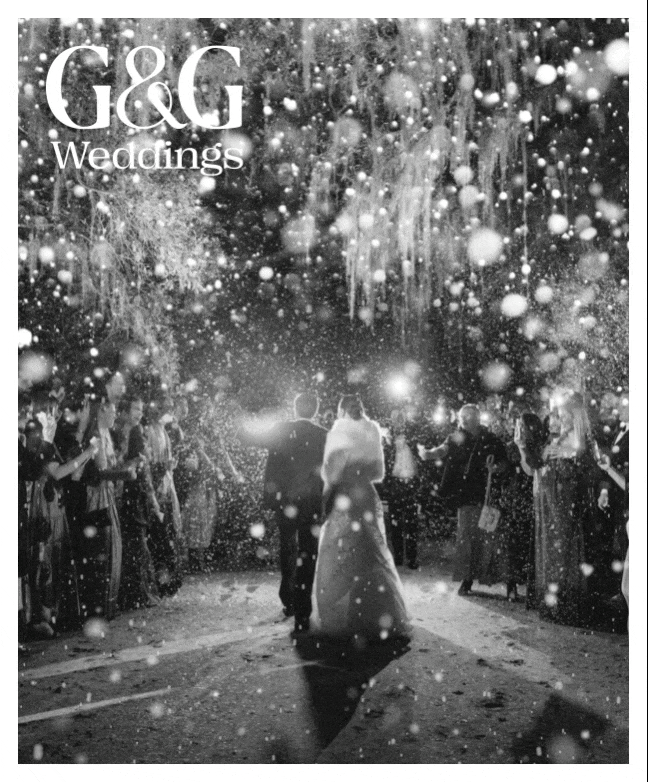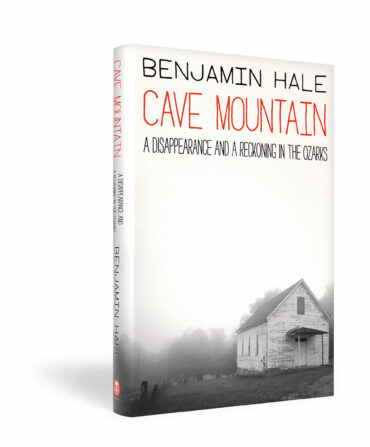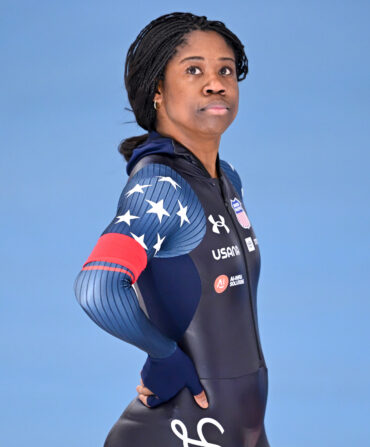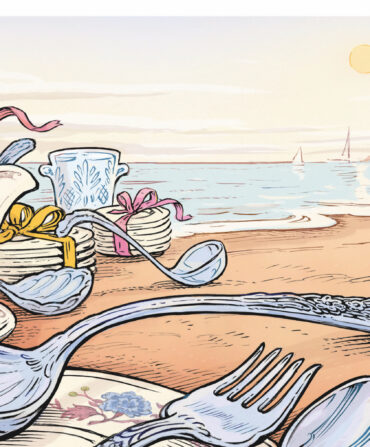It should come as no surprise that Brooklyn Decker arrived at her G&G photo shoot at Charlotte’s Intown Golf Club brimming with creative energy. The seasoned model appeared in six Sports Illustrated swimsuit issues (including on the 2010 cover) before pivoting to acting, tech start-ups, and interior design. In fact, the thirty-eight-year-old alum of Netflix’s über-popular Grace and Frankie helped create the look for the virtual-reality golf concept and invested in it along with her husband, tennis Hall of Famer Andy Roddick.
After years living in Austin, Texas, Decker and Roddick and their children, son Hank and daughter Stevie (and bulldog Bob Costas), moved here to her hometown before the pandemic. “We were like, ‘Okay, we get one chance to raise these kids,’” Decker recalls. “We wanted to do it with family.” Now they live next door to her parents, making for an easy commute when she got the call to costar in this summer’s The Runarounds, the new Amazon teen drama from Outer Banks’ Jonas Pate, set and filmed in Wilmington.
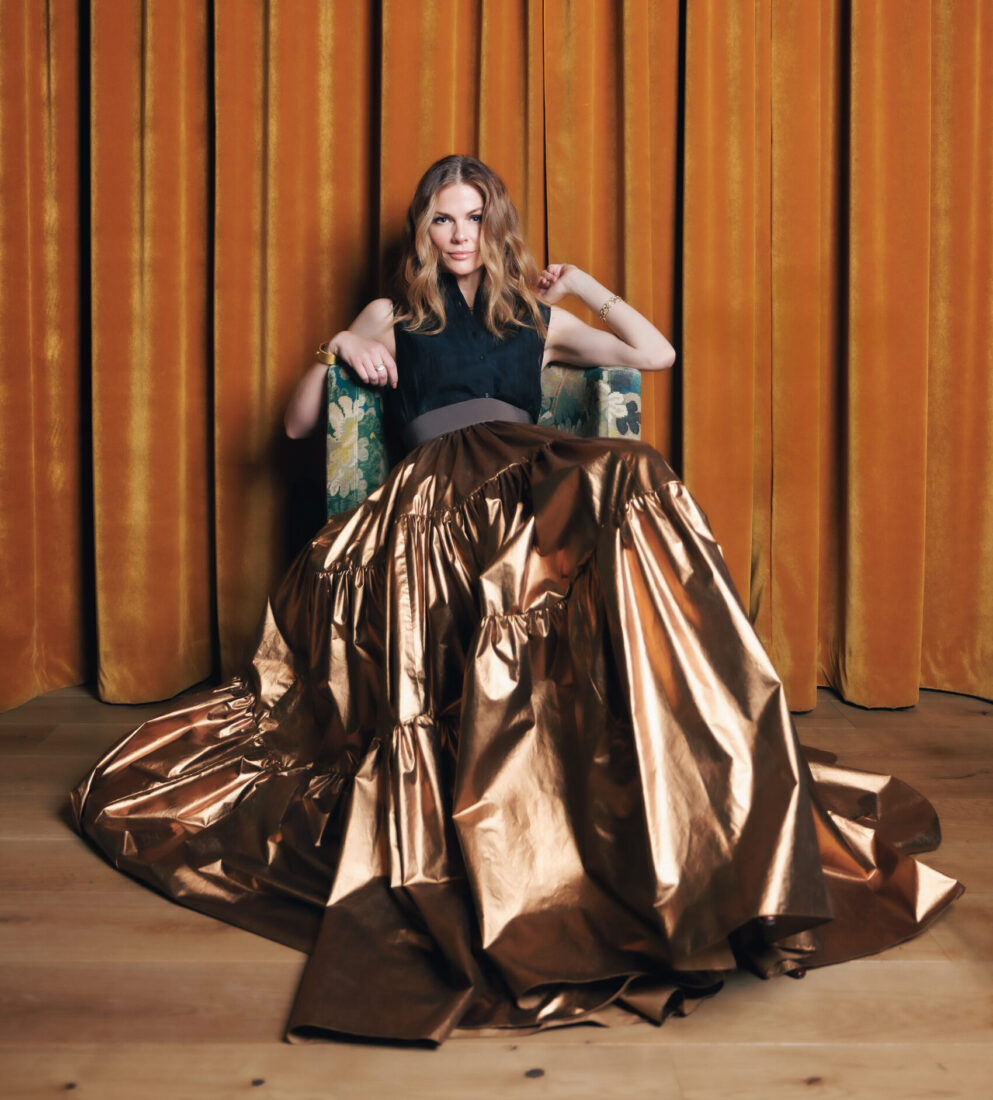
What was it like growing up in [the Charlotte suburb of] Matthews?
In the nineties, we would meet in a field with a boom box, and that was our Friday night. It very much felt like a really, really small town. Now a creative bubble has started to grow in Charlotte. You can feel a huge shift happening.
What’s an ideal day like there now?
We would start the day at Milkbread, which is part of the Kindred restaurant group. It’s so charming—they took over a Dairy Queen. Then we’d probably go to the Whitewater Center or the greenway for a bike ride. One of my favorite things to do with the kids is take them to the Bechtler Museum of Modern Art or the Mint Museum. We love Ever Andalo, from the Supperland team—we’d probably go there for dinner. The kids, they’re begging us to go to Carowinds, but I’m not ready to open that can of worms yet.
Family time is important, too.
My parents’ house is connected to ours. We have a screened-in porch that we share, with a garden out back. It feels like a really old-school way of living, where it’s multigenerational in one unit. My brother, sister-in-law, and their kids are always over. The slowing down, cooking together, kids running barefoot in the yard—all of that is reminiscent of my childhood.
Your family is originally from Ohio, but you’re a big UNC fan. How did you come to pull for the Tar Heels?
I remember in third grade being on the playground and these groups were forming; it was like West Side Story at Matthews Elementary. I’m like, “What is going on here?” And they’re like, “You have to pick your blue. Duke or Carolina.” I don’t know why at the time I picked UNC, but that loyalty has stayed steadfast for decades.
You’re pretty competitive, and obviously, Andy is, too. How does that play out in your household?
My kids don’t even like to be competitive—to them it’s a distraction from enjoying the thing. We had a friend from Los Angeles staying with us during the fires, and she started laughing one day. She was looking at Andy and me and she said, “You two argue over who’s trying to be a better parent and spouse. Your arguments come down to, ‘No, no, I’m going to put them to bed. You put them to bed last night.’ ‘Please let me wake up early and take them to school.’ ‘No, no, no. You sleep in. I’ll take them to school.’ So sadly, we are not as evolved as our children. Competition is threaded through literally everything we do, which is annoying when you’re married to a professional athlete, because they’re going to win at almost everything. I live life as a happy loser, and that’s okay.
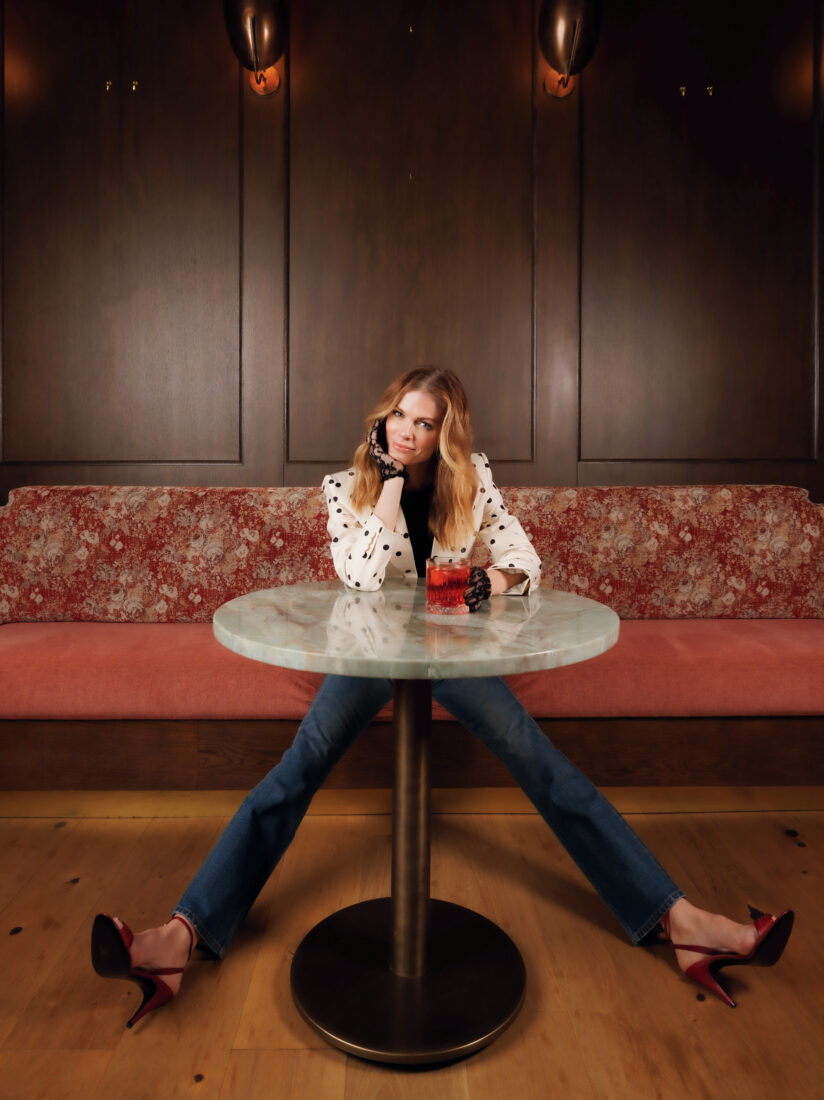
All that being said, you’re also known as being very nice. In a TEDx Talk in Austin, you even called it your superpower as an actor.
I always say, I don’t really care what people think about me, but I deeply care how I make people feel. If we can all just make people feel a little better, this world would be so much happier. My parents are in health care. My brother’s a firefighter in town. They’re literally saving lives and taking care of people, and they’re my examples. While my work isn’t as important as that, I try to take care of people in my own way.
Beyond acting, you’ve been involved in ventures from tech start-ups to now the Intown Golf Clubs. What drives you?
I have a very active creative engine, and my work as an actor is so inconsistent. I can be on a show for eight years and then not work for eighteen months, and then work on something for six months, and then not work for a year. It can be really hard to navigate that cadence. I constantly need to be learning something new, challenging myself, trying to stretch my brain. I love interior design. I had a friend [involved with Intown] who had been very supportive of my own personal design work and was like, “I need your help.” I’d never designed for a commercial space. Now they’re opening their sixth location by the end of this year.
What sparked your interest in design?
I come from a line of carpenters and woodworkers. My granddad is in his mid-eighties. He was a firefighter, and his career was cut short by an injury, so he started woodworking and building houses, carving things. My dad carves and builds things. My brother, he’s built furniture for me. So I had an appreciation for the form of furniture forever.
When I started traveling a lot for work, home all of a sudden became the most important place in my life. I was like, “I need to make this place feel good.” It needs to be really special—a place where we can make high-quality memories.
So it started with our apartment renovation. Then our house build. By the time I was in my late twenties, I had ten projects under my belt. I love creating worlds for other people. It’s not dissimilar to acting in that way.
You’ve also designed homes, including your own, in Cashiers, North Carolina.
It’s our happy spot. We were spending time in Cashiers before [returning to] Charlotte was on our radar. I grew up going to Brevard and Boone and Blowing Rock, and camping all the time. It’s one of the few places where our kids can run around, and I don’t worry about someone being on their cell phone and hitting them on their bikes. Our kids can foster their independence. They can go run in a creek bed and we don’t have to be right there. It feels slow and nostalgic in the best way.
When Grace and Frankie ended, you said that, as a parent, you didn’t want to film in L.A. as much. That had to make saying yes to The Runarounds easier.
During Grace and Frankie, I missed my son’s first day of kindergarten. We were filming in the throes of COVID, and I wasn’t able to fly home. I was a wreck. After we finished the final season, I said, “I can’t be going back and forth to L.A.” So I reached out to my agents and I was like, “I can only work in the South or on the East Coast.”
During COVID, I decided to watch everything that’s been made in North Carolina. I revisited Blue Velvet. Cape Fear. And I discovered Outer Banks, which Jonas Pate cocreated. It was a YA show, and you don’t ever see a cell phone. It felt like watching The Goonies. Like I had been transported back to my childhood. So I started following Jonas, and The Runarounds came up, and it felt like kismet. It showcases the state so beautifully.
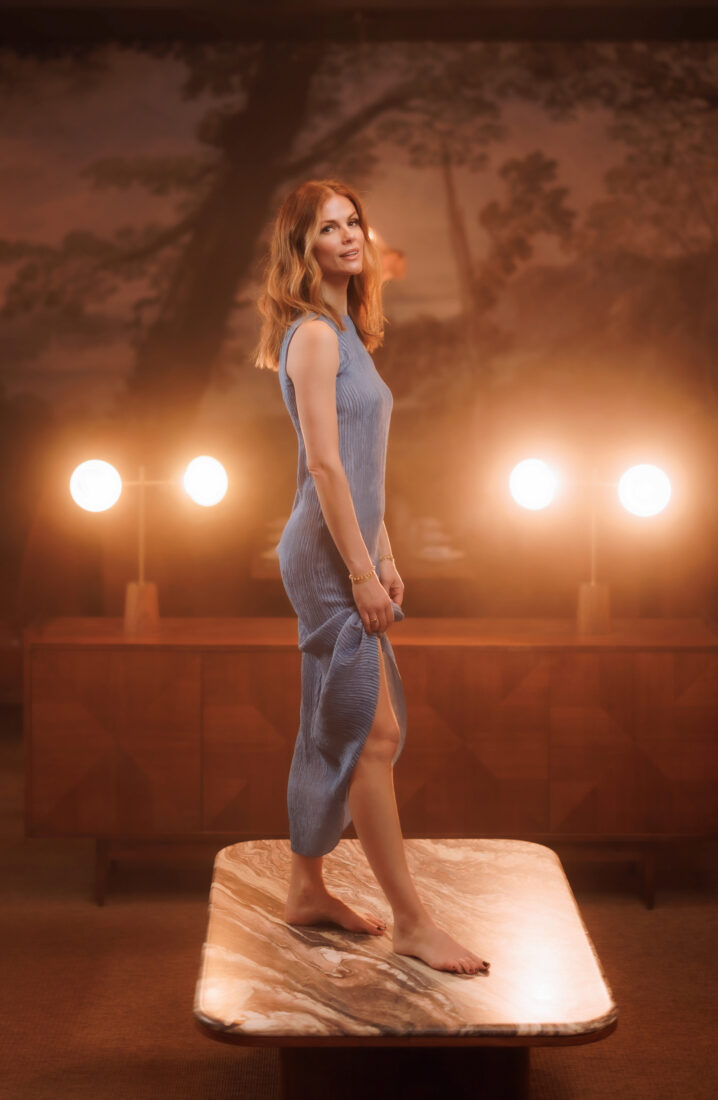
The series centers around teens trying to make it big as a band. You play one of their mothers. Since you were discovered in a Charlotte mall at fourteen, that theme had to resonate.
Very much so. I chose to take a weird path and move to New York to pursue a dream that very much might not have come true. My character is a professor, and is so against her son taking this leap of faith. She wants him to go to college. She wants him to have a guarantee he’ll be okay in life. And I was sitting there, as someone who has taken this path, being like, Baby, fly! Go pursue it!
How did your parents react when you took the leap?
I saw it initially as a way to pay for college. My parents were both working at the hospital and saving up their sick time and vacation to travel with me, because they didn’t want me to be alone on set until I was eighteen. Every summer, I was in New York working. I had amazing representation who protected me, and my parents, they were like, Go for it. Worst case, you fail. I had a ton of failures, and they’ve all made me better.


